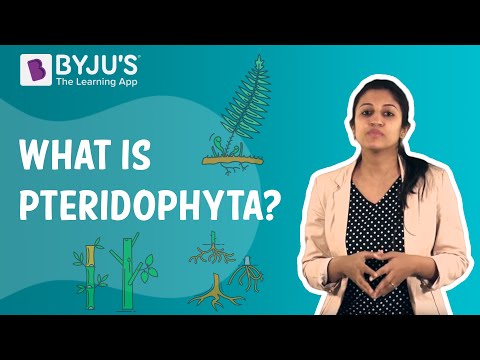Pteridophytes are the first true land plants. They do not reproduce through seeds, instead, they reproduce through spores. Furthermore, Pteridophytes can be classified into Lycopodiopsida and Polypodiopsida. They are seedless, vascular cryptogams and show true alternation of generations.

1. In which of the following groups would you place a plant that produces spores, lacks seeds and has vascular tissue?
(a) Bryophyte
(b) Algae
(c) Pteridophyte
(d) Gymnosperm
Answer: (c)
2. In Pteridophytes, the dominant generation is
(a) gametophytic
(b) haploid
(c) diploid
(d) triploid
Answer: (c)
3. Reduction division in pteridophytes occurs in
(a) Prothallus is formed
(b) Gametes are formed
(c) spores are formed
(d) sex organs are formed
Answer: (c)
4. Prothallus represents
(a) sporophytic phase in a fern
(b) gametophytic phase in a fern
(c) sporophytic phase in a gymnosperm
(d) gametophytic phase in a gymnosperm
Answer: (b)
5. Pteridophytes and Bryophytes differ in having
(a) Spermatozoids
(b) Archegonia
(c) Separate gametophytes
(d) conducting system
Answer: (d)
6. Which of the following is deemed to be vital in the development of seed habit?
(a) Heterospory
(b) Dependant sporophyte
(c) Free-living gametophyte
(d) Haplontic life cycle
Answer: (a)
7. Sporophytic and gametophytic phases are independent in
(a) Bryophytes
(b) Pteridophytes
(c) Phaeophytes
(d) Gymnosperms
Answer: (b)
8. ‘Club moss’ belongs to
(a) Fungi
(b) Algae
(c) Bryophyta
(d) Pteridophyta
Answer: (d)
9. Phloem is without ___________ in pteridophytes
(a) Bast fibres
(b) Companion cells
(c) Phloem parenchyma
(d) sieve cells
Answer: (b)
10. This group does not have seeds but has vascular tissues and produces spores
(a) Pteridophyta
(b) Bryophyta
(c) Angiosperms
(d) Gymnosperms
Answer: (a)
Comments